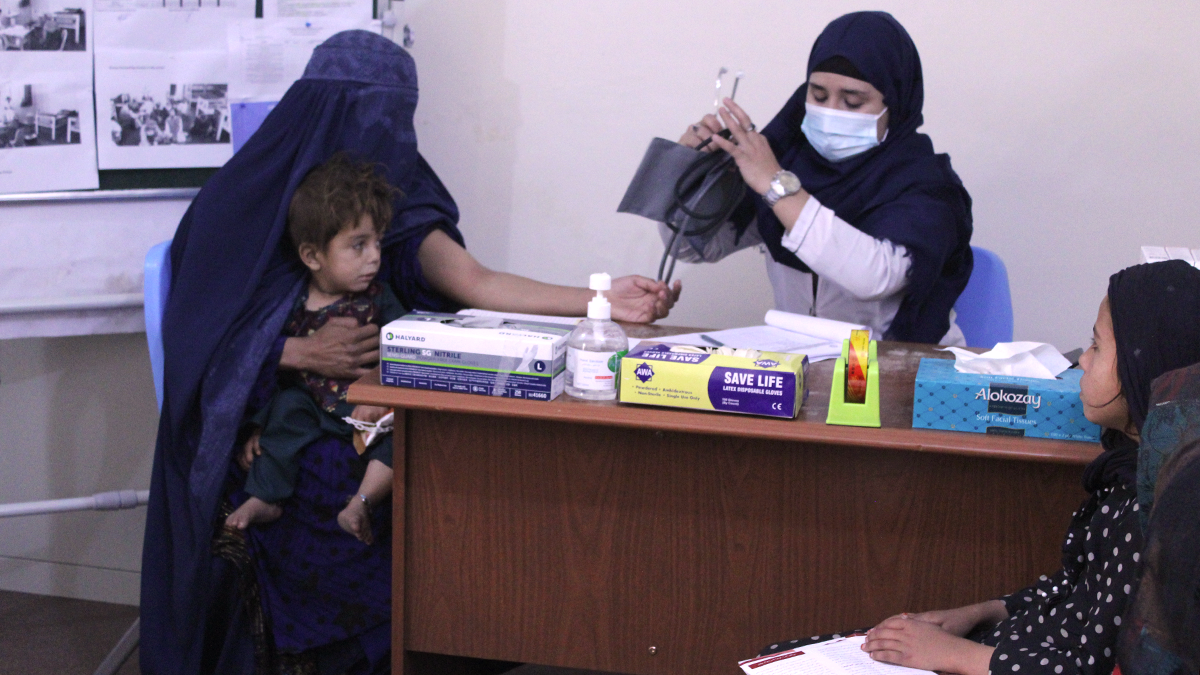
Customers at the Youth Health & Development Organization.
Kandahar, (Afghanistan) - 9 November 2023 – A group of people gather at a healthcare clinic in southern Afghanistan.
Although the medical needs in the region are extensive, these men and women are not there for treatment. Rather, they are there to learn how to prevent and detect human trafficking.
They are nurses, mental health specialists and counsellors, who are being trained by the United Nations Office on Drugs and Crime (UNODC) under its Global Action against Trafficking in Persons and the Smuggling of Migrants (GLO.ACT) initiative.
“This is a pilot project that was launched late last year following a one-and-half year suspension of project activities in the country,” says Aimée Comrie, GLO.ACT Project Coordinator.
She adds that it was “enormously difficult” to restart operations, but an appeal from the officials supported by her team under previous projects made her realize a solution had to be found.
“We had been training female judges, policymakers and police officers. They asked us not to walk away from Afghanistan and from the work we had been doing.”
GLO.ACT decided to focus on healthcare - an issue within UNODC’s mandate and a key sector in anti-trafficking efforts.
“Healthcare workers come into contact with victims and need to be aware of the indicators of human trafficking and the specific needs of the people who are exploited,” says Comrie.
In partnership with the Afghan Youth Health Development Organization, UNODC operates a clinic in Kandahar that provides free medical services and counselling.
The GLO.ACT National Project Officer for Afghanistan, Ghulam Haider Nader, says the needs are “great and growing.”
“Between seven hundred and one thousand patients visit the clinic each month for treatment for a variety of medical conditions and counselling,” he says.
The patients include people with drug dependency issues, homeless and vulnerable people and their children, returnee migrants and internally displaced people.
Seven healthcare staff (three women and four men) attend to their needs in a six-room building, with people often queuing and waiting for up to eight hours.
“All staff have been trained to identify cases of trafficking and provide treatment and support that is tailored to the specific health needs of victims,” says Nader.
“The services we offer also aim to prevent further consequences of exploitation such as severe anxiety, depression and the risk of suicide.”
A series of information pamphlets, translated into the local language, are available at the clinic, while regular awareness raising events on the prevalence and dangers of human trafficking and irregular migration are offered and are proving to be highly popular.
“A nurse explains how a trafficker could approach them with attractive but fake job offers that lead to exploitation,” explains Comrie.
The UNODC project is also providing training for medical staff in the Kandahar region on the indicators of trafficking for organ removal and the appropriate treatment for such cases.
In a recent report on GLO.ACT’s work in Afghanistan, a community elder described how people in his village were monitoring the movements of their children to prevent them from being kidnapped by human traffickers for organ removal, particularly for kidneys.
“We try to prevent this form of exploitation by warning patients about the severe health consequences, even if they’re told by a trafficker that the risks are minimal and are tempted to sell an organ due to economic need,” says Comrie.
According to UNODC research, Afghanistan has an estimated four million drug users, which accounts for around 10 per cent of the population.
“There are clear links between drugs and human trafficking. Addiction can be an indicator of ongoing exploitation and can increase vulnerability to trafficking,” explains Anubha Sood, UNODC’s Country Representative in Afghanistan.
Since the majority of the patients who attend the Kandahar clinic come for medical treatment related to their drug abuse issues, staff are particularly vigilant when caring for such patients.
“Traffickers take advantage of people with drug abuse problems,” says Ghulam Haider Nader.
“They deceive them with false employment opportunities because they know they need money to finance their habit. Or victims become addicted after they have been trafficked,” he adds.
The expert explains that traffickers use drugs during exploitation to control their victims and make them dependent and compliant.
The clinic’s lead doctor says his team is providing “essential but limited assistance.”
“We’re caring for the neediest people, in a confidential manner. Some of our patients, in particular those who use drugs, would not be able to go to other clinics for fear of being imprisoned or stigmatized.”
Due to the coaching provided by UNODC, staff are now aware of the signs of human trafficking and the appropriate questions to ask.
“When we suspect that a patient is a victim of this crime, we ask if their documents have been confiscated, whether they’re subjected to violence or threats against themselves or family members,” explains a clinic counsellor.
“With potential cases of forced labour, we ask if they’re paid and how much, if they’re punished as a form of discipline and about their freedom of movement. With children, we need to establish if the work is unsuitable for their age or in hazardous conditions,” she adds.
Although clinic staff say they are seeing the “positive impact” of their work, they stress that additional funding and resources are urgently needed.
“Victims of human trafficking need a complete cycle of care which we can’t do with current resources,” says GLO.ACT’s Ghulam Haider Nader, adding that the clinic staff simply “try their best” to prevent exploitation and assist patients.
“Survivors need to be referred to shelters, they need assistance for recovery, rehabilitation and reintegration back into society. Unfortunately, at the moment, this kind of support is not available in Afghanistan,” he concludes.
The Global Action against Trafficking in Persons and the Smuggling of Migrants – Asia and the Middle East (GLO.ACT Asia and the Middle East) is a joint initiative by the European Union and UNODC, being implemented in partnership with the International Organization for Migration.